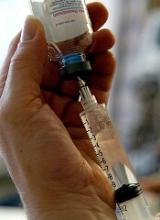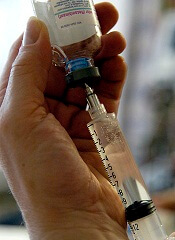User login
The US Food and Drug Administration (FDA) has accepted for priority review the biologics license application (BLA) for emicizumab.
The BLA is for emicizumab as once-weekly prophylaxis for adults, adolescents, and children with hemophilia A and factor VIII inhibitors.
The FDA grants priority review to applications for products that may provide significant improvements in the treatment, diagnosis, or prevention of serious conditions.
The agency’s goal is to take action on a priority review application within 6 months of receiving it, rather than the standard 10 months.
The FDA plans to make a decision on the BLA for emicizumab by February 23, 2018.
About emicizumab
Emicizumab (formerly ACE910) is an investigational, bispecific monoclonal antibody designed to bring together factors IXa and X, proteins required to activate the natural coagulation cascade and restore the blood clotting process.
The drug is administered by subcutaneous injection of a ready-to-use solution. It was created by Chugai Pharmaceutical Co., Ltd. and is being co-developed by Chugai, Roche, and Genentech.
The BLA for emicizumab is based on results from a pair of phase 3 studies—HAVEN 1 and HAVEN 2.
Results from HAVEN 1 were published in NEJM and presented at the 26th ISTH Congress in July. Interim results from HAVEN 2 were presented at ISTH as well.
HAVEN 1
HAVEN 1 is a randomized, phase 3 study in which researchers evaluated the efficacy, safety, and pharmacokinetics of emicizumab prophylaxis compared to on-demand bypassing agents (BPAs; no prophylaxis) in adults and adolescents (12 years of age and older) with hemophilia A and inhibitors to factor VIII.
The study included 109 patients who were previously treated with BPAs on-demand or as prophylaxis.
There was a significant reduction in treated bleeds of 87% (risk rate=0.13, P<0.0001) with emicizumab compared with no prophylaxis.
Adverse events occurring in at least 5% of patients treated with emicizumab were local injection site reactions, headache, fatigue, upper respiratory tract infection, and arthralgia.
Two patients experienced thromboembolic events (TEs), and 3 had thrombotic microangiopathy (TMA) while receiving emicizumab prophylaxis and more than 100 u/kg/day of the BPA activated prothrombin complex concentrate, on average, for 24 hours or more before the event. Two of these patients had also received recombinant factor VIIa.
Neither TE required anticoagulation therapy, and 1 patient restarted emicizumab. The cases of TMA observed were transient, and 1 patient restarted emicizumab.
HAVEN 2
HAVEN 2 is a single-arm, phase 3 study in which researchers are evaluating the efficacy, safety, and pharmacokinetics of once-weekly emicizumab in children (younger than 12 years of age) with hemophilia A and inhibitors to factor VIII who require treatment with BPAs.
The interim analysis included 19 children. After a median observation time of 12 weeks, 1 of the 19 children had a treated bleed. There were no reported joint or muscle bleeds.
The most common adverse events were mild injection site reactions and nasopharyngitis. No TEs or TMA events were observed. ![]()
The US Food and Drug Administration (FDA) has accepted for priority review the biologics license application (BLA) for emicizumab.
The BLA is for emicizumab as once-weekly prophylaxis for adults, adolescents, and children with hemophilia A and factor VIII inhibitors.
The FDA grants priority review to applications for products that may provide significant improvements in the treatment, diagnosis, or prevention of serious conditions.
The agency’s goal is to take action on a priority review application within 6 months of receiving it, rather than the standard 10 months.
The FDA plans to make a decision on the BLA for emicizumab by February 23, 2018.
About emicizumab
Emicizumab (formerly ACE910) is an investigational, bispecific monoclonal antibody designed to bring together factors IXa and X, proteins required to activate the natural coagulation cascade and restore the blood clotting process.
The drug is administered by subcutaneous injection of a ready-to-use solution. It was created by Chugai Pharmaceutical Co., Ltd. and is being co-developed by Chugai, Roche, and Genentech.
The BLA for emicizumab is based on results from a pair of phase 3 studies—HAVEN 1 and HAVEN 2.
Results from HAVEN 1 were published in NEJM and presented at the 26th ISTH Congress in July. Interim results from HAVEN 2 were presented at ISTH as well.
HAVEN 1
HAVEN 1 is a randomized, phase 3 study in which researchers evaluated the efficacy, safety, and pharmacokinetics of emicizumab prophylaxis compared to on-demand bypassing agents (BPAs; no prophylaxis) in adults and adolescents (12 years of age and older) with hemophilia A and inhibitors to factor VIII.
The study included 109 patients who were previously treated with BPAs on-demand or as prophylaxis.
There was a significant reduction in treated bleeds of 87% (risk rate=0.13, P<0.0001) with emicizumab compared with no prophylaxis.
Adverse events occurring in at least 5% of patients treated with emicizumab were local injection site reactions, headache, fatigue, upper respiratory tract infection, and arthralgia.
Two patients experienced thromboembolic events (TEs), and 3 had thrombotic microangiopathy (TMA) while receiving emicizumab prophylaxis and more than 100 u/kg/day of the BPA activated prothrombin complex concentrate, on average, for 24 hours or more before the event. Two of these patients had also received recombinant factor VIIa.
Neither TE required anticoagulation therapy, and 1 patient restarted emicizumab. The cases of TMA observed were transient, and 1 patient restarted emicizumab.
HAVEN 2
HAVEN 2 is a single-arm, phase 3 study in which researchers are evaluating the efficacy, safety, and pharmacokinetics of once-weekly emicizumab in children (younger than 12 years of age) with hemophilia A and inhibitors to factor VIII who require treatment with BPAs.
The interim analysis included 19 children. After a median observation time of 12 weeks, 1 of the 19 children had a treated bleed. There were no reported joint or muscle bleeds.
The most common adverse events were mild injection site reactions and nasopharyngitis. No TEs or TMA events were observed. ![]()
The US Food and Drug Administration (FDA) has accepted for priority review the biologics license application (BLA) for emicizumab.
The BLA is for emicizumab as once-weekly prophylaxis for adults, adolescents, and children with hemophilia A and factor VIII inhibitors.
The FDA grants priority review to applications for products that may provide significant improvements in the treatment, diagnosis, or prevention of serious conditions.
The agency’s goal is to take action on a priority review application within 6 months of receiving it, rather than the standard 10 months.
The FDA plans to make a decision on the BLA for emicizumab by February 23, 2018.
About emicizumab
Emicizumab (formerly ACE910) is an investigational, bispecific monoclonal antibody designed to bring together factors IXa and X, proteins required to activate the natural coagulation cascade and restore the blood clotting process.
The drug is administered by subcutaneous injection of a ready-to-use solution. It was created by Chugai Pharmaceutical Co., Ltd. and is being co-developed by Chugai, Roche, and Genentech.
The BLA for emicizumab is based on results from a pair of phase 3 studies—HAVEN 1 and HAVEN 2.
Results from HAVEN 1 were published in NEJM and presented at the 26th ISTH Congress in July. Interim results from HAVEN 2 were presented at ISTH as well.
HAVEN 1
HAVEN 1 is a randomized, phase 3 study in which researchers evaluated the efficacy, safety, and pharmacokinetics of emicizumab prophylaxis compared to on-demand bypassing agents (BPAs; no prophylaxis) in adults and adolescents (12 years of age and older) with hemophilia A and inhibitors to factor VIII.
The study included 109 patients who were previously treated with BPAs on-demand or as prophylaxis.
There was a significant reduction in treated bleeds of 87% (risk rate=0.13, P<0.0001) with emicizumab compared with no prophylaxis.
Adverse events occurring in at least 5% of patients treated with emicizumab were local injection site reactions, headache, fatigue, upper respiratory tract infection, and arthralgia.
Two patients experienced thromboembolic events (TEs), and 3 had thrombotic microangiopathy (TMA) while receiving emicizumab prophylaxis and more than 100 u/kg/day of the BPA activated prothrombin complex concentrate, on average, for 24 hours or more before the event. Two of these patients had also received recombinant factor VIIa.
Neither TE required anticoagulation therapy, and 1 patient restarted emicizumab. The cases of TMA observed were transient, and 1 patient restarted emicizumab.
HAVEN 2
HAVEN 2 is a single-arm, phase 3 study in which researchers are evaluating the efficacy, safety, and pharmacokinetics of once-weekly emicizumab in children (younger than 12 years of age) with hemophilia A and inhibitors to factor VIII who require treatment with BPAs.
The interim analysis included 19 children. After a median observation time of 12 weeks, 1 of the 19 children had a treated bleed. There were no reported joint or muscle bleeds.
The most common adverse events were mild injection site reactions and nasopharyngitis. No TEs or TMA events were observed. ![]()

